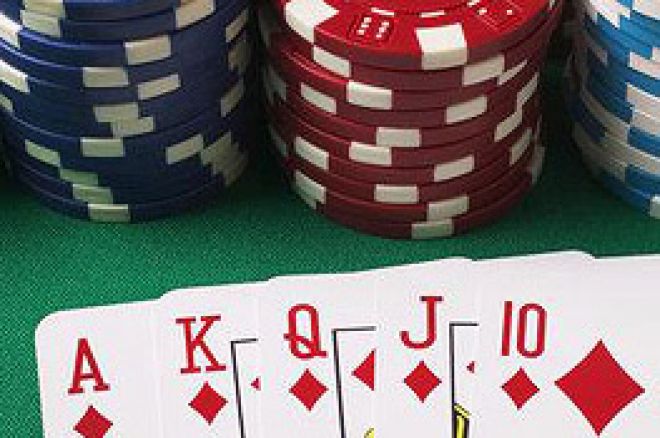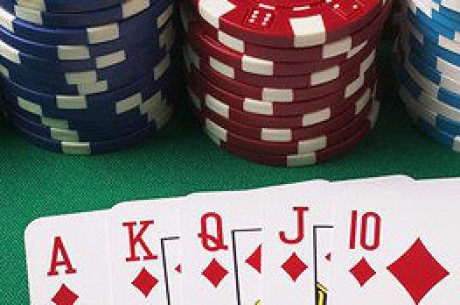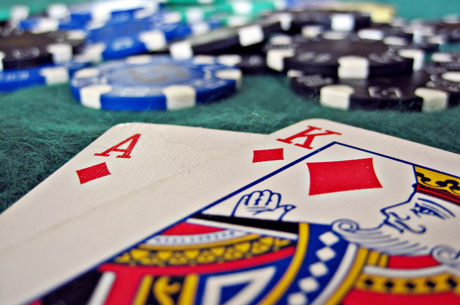Stud Poker Strategy - Folding

If you've been keeping track of my suggested playable hands on Third Street in 7-Card Stud you've probably reached one obvious conclusion. If you limit yourself to just the hands I've suggested: pairs, trips, 3-Flushes and 3-Straights; then most of the time you won't be playing at all. Most of the time, in fact the large majority of the time, you'll be folding.
If you're a naturally competitive sort of person, as most good poker players are, there is something very frustrating, at least initially, about folding so often. The instincts of most players shout out for us to get in there and mix it up. Quitting is no way for a competitor to behave. What about that old adage, "Quitters never win and winners never quit"? How can you be expected to win at Stud if you don't even enter the hand?
The truth is that folding, tough though it may be, is the key to winning in the long run. We win by being selective - playing only those hands and in those situations where we have some advantage; not playing in those situations and with those hands when we have large disadvantages.
Even so, it is a difficult practice to follow. It breeds boredom, distraction, and impatience. The successful player will eventually develop the self control and discipline necessary to follow strict starting hand guidelines. But until then, what's a player to do?
I have a few suggestions for keeping you focused even while you fold many of your starting hands. Use them to keep your game sharp and your mind in the game when you do play.
First of all, I suggest practice away from the poker table itself. There are some computer programs or even play money games that you can use to make folding certain low value hands habitual. The one I've found to be the best is Wilson's Turbo 7-Card Stud. It is really an excellent tool for many reasons. It can simulate styles of play; it allows you to set up different hand situations to find out the most profitable way of playing in certain conditions. And, for this purpose, it has no rival - as it can general over a hundred starting hands an hour for you to play - tracking your results against computer generated players. It even has a hand advisor feature that alerts you to calls that are out of line - keeping you focused on folding all but your premium starting hands.
In the play money games you can do the same thing. Just get into the habit of folding low value hands on Third Street. Keep at it until it becomes second nature. Read a book or check your email while you're doing it if you'd like. The key is for you to eventually recognize that all hands of a certain type fall into the category of unplayable - allowing you to dump them immediately and without thought.
Keep in mind that you won't always be playing like this. In fact, as you become better and more experienced you will find that nearly any hand becomes playable in some situations. But at first, you need to become like a disciplined batter, just waiting for your pitch.
Practice aside; waiting for high quality hands becomes boring even for the best of us. So I suggest a couple of things to do at the table to help you wait out the long stretches of crummy cards that are bound to interrupt your poker sessions from time to time.
Exercise at the table Toe crunches, neck rolls, shoulder shrugs, making and unmaking your fist, leg straightening, deep breathing exercises and varied isometric exercises can all be done while you're seated. Do them. Similarly, just standing up and walking back and forth behind your chair releases tension and gets your blood flowing. Do it. Don't become glued to your chair, immobile and inert. Keep yourself moving and you're less likely to succumb to the temptation to play a hand just to keep busy.
Exercise away from the table. Most poker rooms are located in places where you can walk around - at least for a few hundred yards around the poker room. If need be go outside and get some fresh air. Your hand will still be there when you get back. You lose nothing by walking away from the table and you gain a lot. You give yourself time to think about what's been going on, to pump your confidence up, and to reinvigorate your self control and discipline.
While you're at it, get something to eat from time to time. Make sure you become the master of your play and not the other way around. Deliberately interrupt the habit of sitting, get a snack, think about what you're doing and go back refreshed. If you are agitated, tired, terribly bored or distracted then leave for good. There's always another day and another game.
One final note about folding. If you've been seated at the table and getting no cards for 20 minutes or more, and have been diligently folding every unplayable hand, even your denser opponents are going to notice that you have been playing tightly. If you finally do get a Premium Pair and raise it becomes increasingly likely that everyone will fold. You don't want to be seen in this light - as a rock. The way to make your opponents forget how tightly you have been playing is to leave for a while. Most of them have very short memories and will not remember what you did before you took your walk. So help them forget.
Ed Note: We think Paradise Poker is a great place to learn the game of Stud, without making a studly dent in your bankoll.








